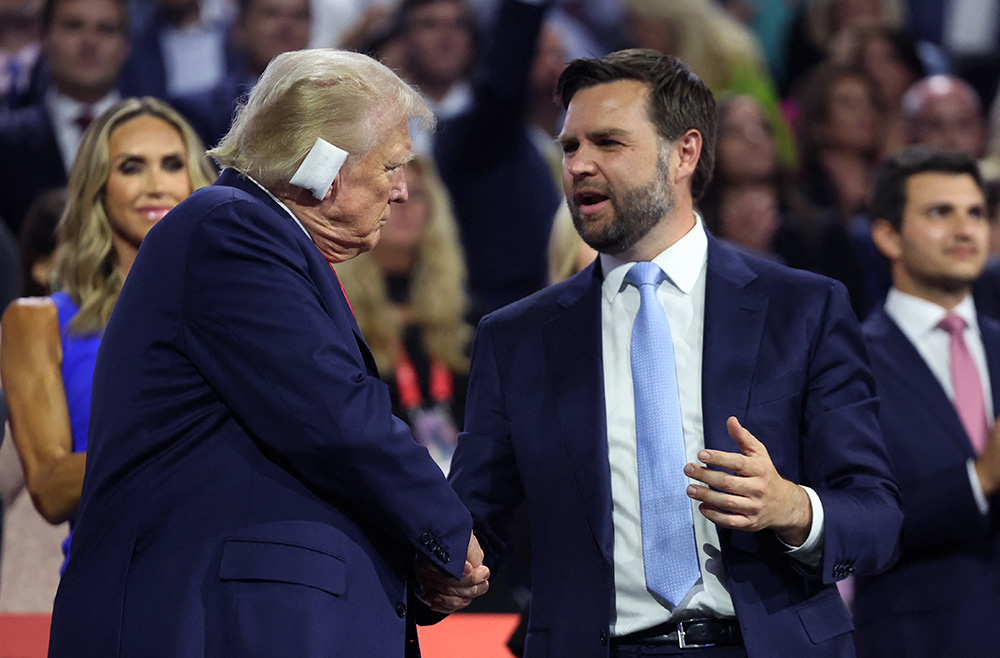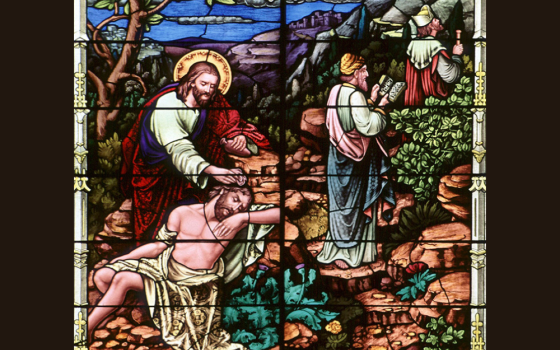
Republican presidential nominee and former President Donald Trump and Republican vice presidential nominee J.D. Vance interact during the Republican National Convention in Milwaukee July 15. Trump was shot in the ear July 13 in an assassination attempt during a campaign rally in Butler, Pennsylvania, that also claimed the life of at least one spectator and critically injured two others before the shooter was shot dead by the Secret Service. (OSV News/Reuters/Andrew Kelly)
Several leading Catholic bishops took to social media to express their horror and to offer prayers in the hours immediately following the attempted assassination of former President Donald Trump on July 13.
In addition to praying for Trump and the other victims of the shooting, including a man who was killed by gunfire during the campaign rally in Butler, Pennsylvania, the bishops called for national unity, an end to political and gun violence, and urged Americans to dial down the partisanship.
"We must turn from the path of violence. May the Lord bless our troubled nation," Bishop Robert Barron of Winona-Rochester, Minnesota, wrote on X, the social media platform previously known as Twitter.
"Dear Lord, put an end to this political violence," said San Francisco Archbishop Salvatore Cordileone, who also wrote on X that democracy "dies in gunfire." He later commended former U.S. House Speaker Nancy Pelosi, a Catholic Democrat whom he has clashed with for her stance on abortion rights, for condemning the attack on Trump.
Observers said the Catholic Church, with its flock evenly split between Democrat- and Republican-leaning voters, is uniquely situated to promote the kind of unity that the bishops as well as Trump and President Joseph Biden have been calling for in the days since the shooting.
"We're the perfect place to encourage dialogue and understanding," said Jesuit Fr. Thomas Reese, a journalist who has covered the U.S. Catholic bishops for decades. Reese said the synodality that Pope Francis has made a centerpiece of his pontificate would be particularly useful to help bridge the nation's partisan divide.
"Just as how we have conversations in the Spirit, where we listen to one another and share our feelings about the church, we can also share our feelings about our country," Reese told NCR. "We could lead the country in showing that people can have different opinions about politics and still do it without resorting to violence or hatred."
However, some leading conservative Catholic groups and individuals were not in the mood for conciliatory statements after Trump was nearly killed by a would-be assassin's bullet, which grazed and bloodied his right ear.
"Democrats are responsible for this senseless bloodshed," Kristan Hawkins, a Catholic laywoman who is the president of Students for Life America, a leading anti-abortion group, wrote July 13 on social media.
The controversial political nonprofit CatholicVote, which has endorsed Trump for president, echoed that sentiment, also posting and sharing comments on July 13 that blamed Democrats for inciting violence by accusing Trump of being a would-be authoritarian and threat to democracy.
"Maybe Biden should start with an apology for calling Trump and his supporters an existential threat to the country," CatholicVote posted on X.
U.S. Sen. J.D. Vance, the Catholic Republican from Ohio whom Trump selected July 15 to be his running mate, was among a handful of elected officials, which included far-right Congresswoman Marjorie Taylor Greene and Sen. Tim Scott, to blame Democrats for the violence.
"The central premise of the Biden campaign is that President Donald Trump is an authoritarian fascist who must be stopped at all costs. That rhetoric led directly to President Trump's attempted assassination," Vance wrote on X.
In the days since the shooting, however, Trump in his social media postings has dialed down the partisanship and called for national unity. His son, Eric Trump, told NBC News on July 15 that his father "ripped up" the speech he was going to deliver at the Republican National Convention in favor of a more conciliatory, "incredibly positive" address.
That Trump selected Vance, a former Trump critic who has since come to embrace the former president's Make America Great Again movement since entering politics, is an "interesting choice" for a variety of reasons, said Geoffrey Layman, the chairman of the political science department at the University of Notre Dame.
"If the Trump campaign is really taking a hard turn toward more of a unifying theme, this does not seem like the logical choice to pick somebody who is a pretty unrestrained attack dog in his political style. That seems particularly non-unifying," Layman told NCR.
Advertisement
Adding that he believes the Trump campaign may have selected Vance before the shooting, Layman said it is possible the campaign may adopt a strategy where Vance becomes an "attack dog" who adopts hardline rhetoric to hammer Biden while Trump purposely adopts a rosier, more positive public persona.
"Given that Trump is already the frontrunner and the attempt on his life makes him a more sympathetic figure than what he was, he now has more to gain to play the unity card," Layman said. "On the other hand, nothing in Trump's eight years in politics suggests that he is a unifier or someone who is going to focus on broad, 'Isn't America Beautiful' themes like Ronald Reagan."
Judging by history and the country's still-polarized political environment, Layman added that he does not believe the calls to unity will last long.
"These things tend to give way to political acrimony pretty quickly," Layman said. "We certainly saw that during the pandemic. We saw that after 9/11, where we had national unity for a time. But by the 2004 presidential election, that had long since given way to our usual partisan rancor."








